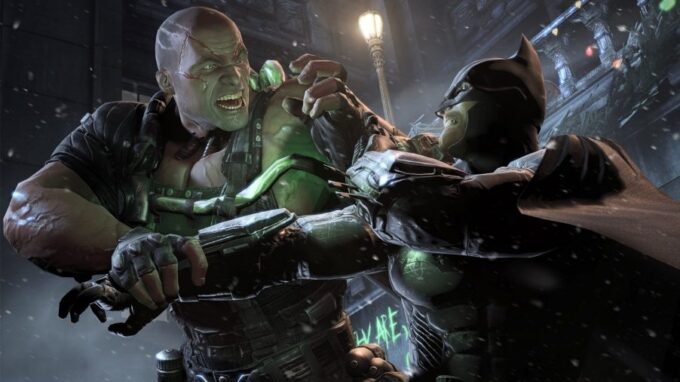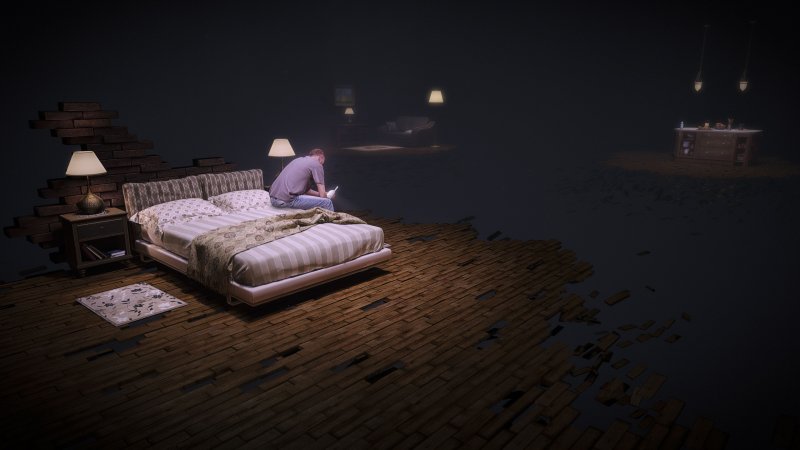Uggh, argh, ahhhhhhhhhhhhhh.
Chances are you’ve probably heard these expressions in video games thousands of times. Every time you’ve punched, kicked, shoved, cut, or shot another character in a video game, it’s almost certain that they’ve let out some sort of moan, grunt, or scream. However, these noises aren’t cooked up by some computer. They are often the moans, grunts, and screams from real voice actors, so I spoke with actor J. B. Blanc to find out how this particular kind of sausage gets made.
First things first, allow me to introduce J. B. Blanc. Blanc graduated from the Royal Academy of Dramatic Art in London, and since then, he has acted in everything ranging from theater to television to full-length films. He has also had extensive experience working as a voice actor in things like animated television and video games. As a video game voice actor, you may recognize his voice as Rost from Horizon: Zero Dawn or Bane from Batman: Arkham Origins. He has also recently begun voice directing video games, including games in the Middle Earth: Shadow of Mordor series.

Blanc at San Diego Comic Con 2013 discussion his role as Alfred in Beware the Batman. (Image Credit: Misfits of Scifi)
If I were to take away just one thing from our talk, it would be this: Doing sounds like grunts and groans in video games, called efforts or exerts in the voice acting world, is hard work. Possibly harder than any other voice work.
I’ve been very lucky in my career. I’ve worked in film, television, theater, and done everything from audio books to cartoons to commercials to video games. Video game voice acting is one of the hardest things I’ve ever done. The sheer range of stuff that you need to come up with to do it, the amount of physicality you have to put into it in a very short space of time is extremely exhausting.
However, to fully understand why doing efforts are so difficult and exhausting for voice actors, you must first understand how they are scripted and put together.
The Process
Doing efforts isn’t as simple as shouting in pain into a microphone for a while. According to Blanc, everything that a voice actor records in a booth is scripted, not just actual dialogue lines. For example, while an actor may have a few pages of dialogue in their script to record, he or she will also be given a set of effort instructions that may look something like this:
- 15 punches to the face
- 15 punches to the stomach
- 10 kicks to the ribs
- 10 kicks to the groin
- 5 screams as if you were set on fire
- 5 screams as if you were falling off of a cliff
All of those efforts really pile up, especially if they all need to be recorded in the same session along with dialogue. Just imagine the kind of scream you would project had you just been set on fire. That’s one of the most hellacious screams that you could give as a voice actor. Now imagine having to do that five times, each time slightly different so that the scream doesn’t sound repetitive in the game or so that the developers can pick whichever scream fits best with the animation.
Variety is always the spice of life, and it’s good to have a good range. And also, if I’m giving 10 kicks to the stomach, I’m going to try to give a different sound each time because that gives them a lot more opportunities and makes the character sound less two-dimensional.
Blanc explained to me that one thing that sometimes makes doing efforts a bit easier is being given some sort of guide animation to base your effort off of. For example, if you have to act out being punched in the throat, sometimes developers will show the in-game animation of the character being punched so that the actor can match that. This is especially beneficial for doing scripted, cinematic fight scenes as opposed to the efforts for random enemies in games.
Physicality
When most people think of physical acting, they likely think of theater or film. However, just because voice actors are acting behind a mic, that doesn’t mean that their job is any less physical, and Blanc says this is even more true when doing efforts.
You’ve got to kind of place yourself in that physical situation while still being able to address the microphone. That’s what’s most difficult about it.
While voice acting is often just as physical as other kinds of acting, you often don’t have the advantage of mobility in the booth, Blanc explained. Let’s say you need to act like you’ve just been kicked in the stomach. In theater, you have another actor pretending to punch you, and therefore offering that feedback to that punch is a bit easier. In video games, voice actors don’t have that luxury. Their face needs to be firmly planted in front of the microphone most of the time, and in doing so, their mobility is severely limited. Too much movement could disrupt the sound quality, while too little movement could result in an inauthentic sounding effort.

Of course, restrictive movement becomes less of a problem when you are able to voice record while doing motion capture, like Benedict Cumberbatch did while playing Smaug.
On top of this, efforts tend to be physically demanding in other ways, too, specifically when it comes to your vocal cords. Like I said above, screaming as if you were set on fire is one of the most demanding screams you could possibly act out, and voice actors often need to do it multiple times along with dozens of other efforts. It doesn’t take long until your vocal cords are done for the day if you’re doing nothing but screaming for hours on end, making it even more difficult to do regular line reading. Blanc says he tries to combat this problem as a voice director by having actors do their efforts at the end of the session, leaving the hardest part of the session for last.
However, this can’t apply to every situation. When working on games doing nothing but “additional voices,” Blanc said that his entire recording session could be just efforts.
I’ve worked on games where there is very little dialogue at all and it’s all kind of grunts and exerts. Four hours of getting kicked in the face can be a very sobering and exhaustive exercise.
Also, it’s very likely that an actor has multiple recording sessions in a day, which could leave their voice physically unable to do efforts by the end of the day. Blanc said that there has even been a few times as a voice director where he had to step into the booth and match an actor’s voice so that he could do the actor’s efforts for him. This also happens for inexperienced and/or guest voice actors who have no idea how to do efforts and need other actors to come in and do it for them.
Creating a Character
All acting that an actor does should be true to his or her character, and this holds true for doing efforts, too. Blanc told me that when he was putting together his rendition of the character Bane for Batman: Arkham Origins, he and the developers decided that his Bane should have a very intellectual sounding voice with a Latin accent. So, his efforts as Bane needed to match his dialogue as Bane. While this can sometimes make the voice acting more difficult, Blanc explained to me that it is also 100% necessary, as it would be jarring for the player if when Batman punched Bane in-game he sounded like just another one of the Joker’s goons. He needed to make it sound distinct.
You got to mentally put yourself in the position of this animated character to give an authentic read. I mean, it’s a read really like any line is a read. You have to be as truthful and as authentic as if you were playing a character.
The same technique is applied even when doing a role as “additional voices” for a game like Arkham Origins. Blanc explained to me that doing efforts varies even for the types of goons you might be voicing. For example, while Joker’s henchmen might sounds crazy and/or delirious as you are fighting them as Batman, the Penguin’s thugs might sound dumber and have a deeper voice, and so the efforts for these two groups must be different.

Blanc did the voice work for Rost in Horizon: Zero Dawn, a game in which he had to do plenty of efforts.
The Feedback You Expect
Another key aspect of doing efforts, Blanc explained, is that not only do the efforts have to match the character you are portraying, but the game that the voice will be in, too. For example, the sound that a character makes when they die in a hyper-realistic game like Call of Duty is going to be completely different in a game aimed towards a younger audience like the LEGO Games franchise.
You don’t really die in LEGO, you just kind of sigh in an exasperated way. Something gentler, less offensive, because it’s for the kids.
On the other hand, in a very violent game like Middle Earth: Shadow of Mordor, the efforts are likely to be much more brutal, and often times even more exaggerated than those sounds would be in real life. For example, in Shadow of Mordor, orcs often scream as their heads are chopped off.
The truth is that if you slash someone through the neck with a sword, they probably don’t make much of a noise because the first thing that’s going to be cut off is their vocal cords. But that’s not going to read well, so you have to give a sort of guttural, squelchy noise for someone getting their head chopped off.

*crickets chirping* (Image Credit: N4G user Lukas Japonicus)
The main takeaway from this is that often times the efforts you hear aren’t the most realistic but are what we expect to hear. Blanc has never been shot before, but often has to portray characters who have just been shot. He said that while he did his research and interviewed people on how it felt to be shot, he finds that it often makes more sense to voice how the audience thinks it should sound when someone gets shot, rather than the reality.
Voice Directing
Blanc explained to me that things like efforts would be virtually impossible to do right without the help of a good voice director.
The relationship between a director and an actor in a video game is very different because the director of a video game really is the only person who knows everything that’s going on in that game. Remember, these actors are often walking in blind, not really knowing what project they’re working on, sometimes not even knowing what character they are playing.
He said that efforts can vary greatly depending on the situation in-game, and it’s the director’s job to relay that information so that the actor can give the most authentic effort for that scenario. For example, if the script simply says that the actor needs to give efforts for ten kicks to the shin, it’s the director’s job to explain how hard the kicks are. It might also help to know whether the kicks are a surprise or expected for the character.

I can only imagine how exhausting it must have been to record efforts for For Honor.
Another example that Blanc gave was how a scream could be extremely different if a character is pushed off of a ledge depending on how far the fall is. If it’s just a five foot drop, then the actor should give a short scream. However, if the character is falling multiple stories in-game, then the voice actor needs to know that so that they can give a bigger, longer scream, and it’s the voice director’s job to relay that information to the actor.
Also, in scenes involving multiple actors, the director needs to be the coordinator because actors very rarely get to record alongside each other. If there is a scripted fight scene between two characters, the director needs to tell the voice actor how the other actor delivered their lines so that it will match and feel authentic.
Conclusion
If there’s on thing to take away from all this, it’s this: Voicing efforts is hard work. It’s not as simple as grunting and yelling into a microphone for a couple of minutes. And not only that, but it’s also pretty weird.
I think for newer actors coming into the booth, it’s a very alien thing to ask them to do. In fact, the more I talk to you, the more I realize what a completely bizarre thing it is to do for a living.
However, Blanc believes that poor efforts can really hinder a player’s enjoyment of a game. While good voice acting blends perfectly into a game, bad acting stands out and takes the player out of the immersive experience. Efforts are no different in this sense. When they are done well, you shouldn’t even notice they’re there, but once you begin to notice them, the magic is gone.



